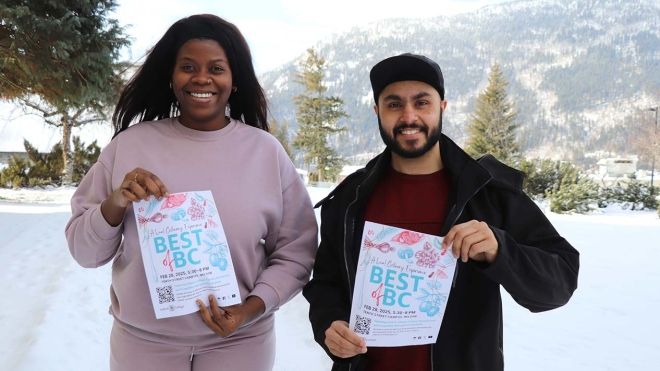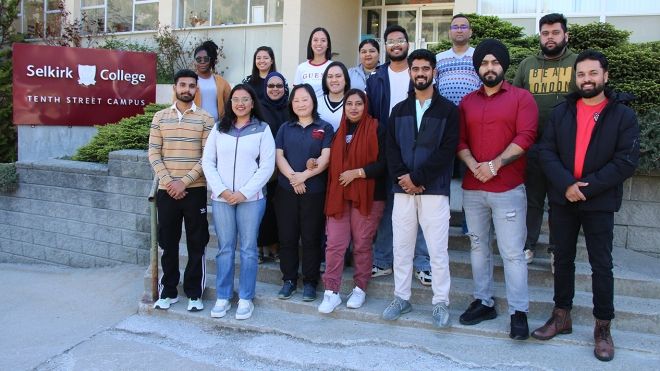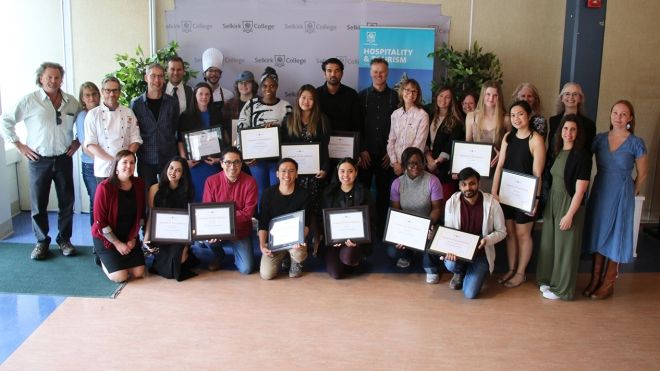Culinary Management - Postgraduate Diploma
*Please note, this program is not accepting applications for the 2025/26 academic year.
Overview
Chefs, food and beverage managers in the hospitality industry and restaurant owners today need business, leadership and human resource skills in addition to a strong culinary foundation. This program provides professional cook training and fundamental management skills for students with culinary backgrounds looking to manage, own or operate a food and beverage business.
Take Your Career to the Next Level
The Culinary Management Diploma is developed for chefs and hospitality program graduates from programs outside of Canada. International students who have a culinary or hospitality credential are welcome to apply for this program. Students will be fast-tracked through a curriculum similar to the Professional Cook courses Level 1 and 2. Additionally, students will gain hands-on industry experience during a paid four-month work term. Alongside the culinary-focused course, students will also complete two semesters of management-level courses.
Labour market research predicts a shortage in this sector and foresees an increase in need for higher-level credentialing, as reported in the Canadian Tourism Human Resource Council’s The Future of Canada’s Tourism Sector, Economic Recession only a Temporary Reprieve from Labour Shortages.
The objective of the program, through classroom instruction, practical lab training and work experience, is to enable students to develop the abilities to work in the fast-paced culinary world with the skills and attitudes to analyze situations objectively and to make effective management decisions.
Program Dates
This program has only one start date per year, in May.
| Term | Month | Details |
|---|---|---|
| 1 | May–June | Practical & kitchen based |
| 2 | September–December | Classroom based |
| 3 | January–April | Kitchen based |
| 4 | May–August | Paid work term |
| 5 | September–December | Classroom based |
Careers
Graduates are equipped to move into supervisory positions in a wide range of capacities across the entire spectrum of the food and beverage industry, including:
- Professional cooks
- Kitchen supervisory positions
- Food and beverage supervisors
News
Program Outcomes
Upon successful completion of this program, learners will be able to:
- Explain terms, concepts and theories relevant to the Canadian culinary and hospitality industries
- Demonstrate developing critical and creative thinking skills
- Apply emerging problem-solving skills
- Communicate effectively and efficiently in various formats to a variety of stakeholders, consistent with industry expectations
- Outline professional and ethical standards within their field
- Conduct themselves in a professional and ethical manner in academic and work-related environments
- Apply basic accounting principles as required
- Apply the basic principles of organizational behaviour, management theories and human resource management
- Competently use standard industry technology in communication and record keeping/data collection
- Explain the function of all standard kitchen equipment
- Demonstrate a working knowledge of restaurant operations and their value to the economy
- Demonstrate proficiency in menu development
- Apply industry-specific government health, safety and environmental standards and regulations
AND
Culinary Arts 1
Upon successful completion of this program, learners will be able to:
- Describe essential elements of trade knowledge
- Describe all relevant industry safety standards, practices and procedures
- Describe all relevant industry sanitary standards
- Demonstrate a variety of basic production procedures
- Describe ordering and inventory practices
- Describe general concepts surrounding ingredients and nutrition
- Prepare stocks, soups, sauces and thickening and binding agents
- Prepare and process vegetables and fruit in a variety of ways
- Prepare and process a variety of starches
- Cut, process and cook meat, poultry and seafood
- Prepare a variety of garde manger items
- Prepare a variety of eggs dishes and breakfast items
- Describe the principles of baking
- Prepare a variety of baked goods and desserts
- Prepare and serve coffee, tea and non-alcoholic beverages
Culinary Arts 2
Upon successful completion of this program, learners will be able to:
- Describe essential elements of trade knowledge
- Describe ordering and inventory practices
- Describe general concepts surrounding ingredients and nutrition
- Describe relevant human resource concepts
- Describe and perform cost-management functions
- Describe front of house operations
- Prepare soups and sauces
- Prepare and process vegetables and fruit in a variety of ways
- Prepare and process a variety of starches
- Cut, process and cook meat, poultry and seafood
- Prepare a variety of garde manger items
- Prepare a variety of baked goods and desserts
Admission Requirements
In addition to meeting the general admission requirements to Selkirk College as outlined in College Policy 8611: Admissions, applicants must meet the following Post Graduate Diploma in Culinary Management Program requirements to be considered fully qualified:
a) Any English course at the Grade 12 level with a minimum grade of "C+." For international applicants, IELTS 6.5 overall band score (with no band less than 6.0), or equivalent on other internationally recognized English language proficiency tests. If an international student applies with an IELTS of 6.0 overall score (with no band less than 5.5), then they would need to meet the requirements of (b).
b) Applicants who lack the specific English admission requirements may still gain admission to the program with the understanding that they will complete ENGL 66 Essential English with a minimum grade of C+ in the first year of their program. This course must be completed to be able to advance beyond 30 program credits.
Postgraduate Culinary Management Program Policies Page 3 of 8
c) Completion of a 2-year culinary diploma or professional cooking certification or completion of a Bachelor’s Degree in Hospitality Management with significant coursework in Culinary Arts from a recognized post-secondary institution. The culinary courses must include both a practical as well as a theory component.
d) Students with a degree in a different field and who possess a shorter credential in the culinary field (one year minimum) will be considered for admission on a case-by-case basis.
Students must acknowledge that they are in good health, able to stand for long periods of time and able to lift up to 25 kg.
1. General
a) Entry to the program will be at the commencement of the Spring semester. Entry may be limited by prerequisites, space limitations, and/or completion of preadmission assessment. International entry may be limited where international student enrolment targets or limits have been met.
b) Accepted applicants will be placed in particular classes and/or sections by the School Chair or designate.
c) No class or section switches will be permitted without the express approval of the School Chair or designate and the instructor.
d) A student admitted to this program will be given preferred access to its courses.
2. Part-time Study
a) Subject to space limitations and prerequisite requirements, a student who wishes to take fewer than the maximum number of courses in any semester may do so with approval from the School Chair.
3. Work Term
a) Participation in the paid work term is mandatory for graduation from the program. See Part IV “Work Term Policy” for more details.
APPLICATION PROCESS
a) Before an applicant's file is completed, the following must be received:
*See Part I, A. 1 and I, A.2
In order to receive your credential in your program, you must maintain a minimum GPA of 2.00 and can carry no more than one (1) failing grade in the previous term courses to be promoted to subsequent terms.
PROMOTION
1. A student must achieve a minimum GPA of 2.00 and can carry no more than one (1) failing grade in the previous semester courses to be promoted to subsequent semesters. Promotion from the first year to the second year also requires a minimum G.P.A. of 2.0 and no more than one failing grade in first year courses. Any student with more than one (1) failure during the first year of the program must have the School Chair’s approval to progress to the next semester and may be required to withdraw.
2. A student will not be permitted to exceed a full semester course load except with the permission of the School Chair or designate.
3. A student whose progress in a course is not satisfactory may be required to withdraw from the course and take an upgrading course which may be associated with an additional cost.
4. Two (2) failures in a course are normally cause for withdrawal from the program. A third attempt at a course may be made at the discretion of the School Chair or designate.
5. Any student who has left the program because of unsatisfactory performance may be readmitted with the approval of the School Chair or designate after consultation with Faculty members and if there is space within the program.
GRADUATION
1. Credentials:
a) Post Graduate Diploma in Culinary Management.
2. Requirements: (see Policy 8617: Graduation)
a) The requirements for graduation for the Post Graduate Diploma in Culinary Management include the successful completion of the following courses with a cumulative GPA of 2.0 and a minimum passing grade of “P” in all courses.
Courses
PGCM099 - Introduction to Community, Culture and Education in Canada
PGCM 099 Introduction to Community, Culture and Education in Canada will introduce and welcome students to Selkirk College, its surrounding community, culture, and educational expectations. This course will highlight learning, community and other helpful resources to assist international students on their post-secondary journey in Canada.
PGCM100 - Culinary Arts 1
PGCM 100 Culinary Arts Level 1 will provide students with the knowledge to perform basic cooking and food preparation tasks utilizing knife skills, correct terminology, and a variety of cooking methods. Students will be able to follow recipes, weigh and measure food accurately, and have an understanding of the foundation techniques and principles used in cooking, baking, and other aspects of food preparation.
PGCM151 - Marketing
PGCM 151 Marketing examines the roles and functions of marketing in the tourism industry. The principles of customer service excellence and service recovery are discussed in detail. You are lead through planning, research, optimization, analytics and communications processes discovering how product, price, plan and promotion (4 P's) are used in the marketing of tourism products and services. E-marketing, and social media techniques and strategies will be discussed and practiced.
PGCM155 - Computer Applications
PGCM 155 Computer Applications will provide the student with a general introduction to computers and Microsoft application software. Setting up and using email and Moodle is emphasized, as assignments will be submitted to the instructor via this venue. The student will also explore and utilize the web and/or online libraries, searching for information for class assignments.
The student will assimilate the basics of Microsoft Word with regards to correct formats for posters / announcements, résumés, research papers, envelopes, letters, tables and newsletters including all page and print enhancements. Form letters, mailing labels and directories are also covered using the Mail Merge function. The student will also cover the basics of Microsoft Excel, using a number of commands to enhance a worksheet, chart sheets, templates and graphs. Page and print enhancements will also be utilized. The final section covers the integration of Word and Excel.
PGCM159 - Business Communications
PGCM 159 Business Communications focuses primarily on written and oral communication skills as they relate to the business world. Topics include writing memos, letters, emails, formal reports and other business correspondence, delivering effective verbal presentations, preparation and research techniques. Understanding the theory of business communication and being able to employ this theory effectively in written and verbal communication is critical for tourism, recreation, and hospitality managers who wish to succeed. This course places emphasis on the conceptual, practical, and technical aspects of effective workplace communication.
TWC164 - Business Communications I
TWC 164 Business Communications I is an introduction to the fundamentals of effective written business communication and their application to workplace communication. Additionally, students will solidify and advance their skills in researching and presenting ideas and reports.
PGCM164 - Food And Beverage Cost Controls
PGCM 164 Food And Beverage Cost Controls introduces the student to the concepts involved in a food and beverage cost control program that would benefit any food and beverage operation. The students will learn and be able to explain income statements including revenues, expenses, and profit. Purchasing & receiving, recipe costing, yielding, menu engineering, labour cost, and beverage costings will also figure prominently during the delivery of this course.
PGCM171 - Work Term
PGCM 171 Work Term is a full-time paid work experience. It is monitored by the College and evaluation is completed by the employer and program instructors. Experiential learning is effective because it provides students with opportunities to acquire supervisory skills and competencies that are applicable to their future careers. This approach recognizes that a supervisor requires significant practice of the principles and skills learned during study and looks to the hospitality industry to provide an environment in which this practice can take place. This work term gives students an opportunity to apply and extend academic knowledge while employed with hospitality employers throughout B.C., Canada and the world.
PGCM200 - Culinary Arts 2
PGCM 200 Culinary Arts 2 will build on using practical cooking methods and theory learnt in the PGCM 100 course. Students will learn production techniques for specialty vegetables, dressings, sauces, and secondary sauces. Additionally, students will understand and prepare foods for volume cooking. The course will also provide preliminary understanding of food costing, menu planning, and the purchasing processes.
PGCM253 Condensed Delivery - Organizational Leadership
PGCM 253 Organizational Leadership is designed to help prospective supervisors understand how individuals and organizations function effectively. It provides students with a working knowledge of the formal relationships between employees and management in the work place through the study of leadership styles, motivation, group dynamics and conflict resolution. Students will gain an understanding of the skills required to lead people and to contribute to a team effort. This course also examines changes in society and how they are influencing organizations relating to employee and management roles in time management, stress management, and problem solving.
PGCM254 - Human Resources Management
PGCM 254 Human Resources Management has a profound effect on the success of tourism operations. An understanding of fundamental human resources theory and practices is necessary in the service sector where the link between the tourism operation and the guest is critical. Innovative and inclusive approaches to human resources management are necessary to recruit and retain the right people in the industry. This course focuses on the critical issues that concern managers in the tourism industry, employee relations, recruiting and retaining representation of the diverse population, challenges in managing people, trends and employment standards.
PGCM265 - Food Service Management
PGCM 265 Food Service Management. The Food and Beverage Department, be it a hotel or resort, is a high profile department and can be a substantial profit centre. It is one thing to understand that you must control a Food and Beverage operation, but it is another to understand how, when and why you must do it. The purpose of this course is to show how you can manage the department to provide desired levels of profitability and customer satisfaction. Through lectures and hands on operations exercises, you will study food and beverage operations and learn how to analyze and implement changes that will affect the success of the food service department.
PGCM269 - Accounting
PGCM 269 Accounting is an introductory course in accounting, from the basic accounting equation to preparation of the Income Statement, Statement of Changes in Owner's Equity, and Balance Sheet. This course covers merchandise operations, service business accounting, depreciation, adjusting entries, as well as specialized journals.
PGCM272 - Hospitality Law
PGCM 272 Hospitality Law outlines Canadian Law applicable to the hospitality industry, identifies areas where there may be potential legal challenges, and discusses rights and liabilities relative to relationships within the hospitality industry. Topics include constitutional law, the common law of contract, definition of hotels and related establishments, safety of guests and torts, care of guests property, sale of food and alcohol, insurance and hotel keepers compensation.
Tuition & Fees
All amounts are estimates and are subject to change. Tuition amounts are based on a full-time course load. Please note that many programs have additional costs beyond those listed here. For more information, please visit Tuition & Fees.
Find Out More
We look forward to connecting with you! Fill out this form and we'll reach out to you.



